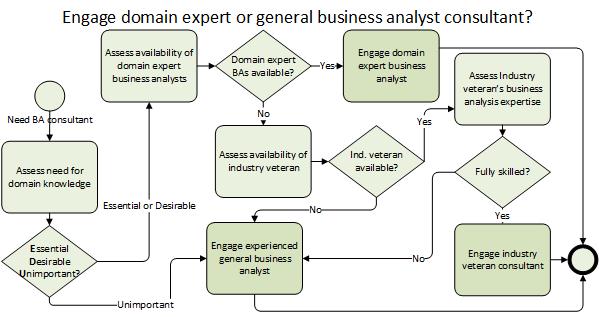Hiring a business consultant? Why domain knowledge isn’t enough on its own
By Peter Meyer, Principal Consultant, Elkera Pty Limited
25 June 2025
When managers of small and medium enterprises face problems with structure or processes, they often turn to someone who ‘knows the business’ to help out. But does familiarity with the industry guarantee the desired outcome?
This question often arises in specialised areas such as not-for-profits and the arts, but I have seen it elsewhere, including in government.
Projects that involve organisational structure, process improvement, or systems planning require expert business analysis skills.
Where is the best place to find those skills? I identify three broad categories of expert business analyst consultant:
- A former senior executive in the subject organisation or another organisation that operates in a similar area who is now acting as a business consultant. I refer to this category as the industry veteran consultant.
- A professional business analyst who has direct experience with, or is an expert in, the relevant business domain. This is the domain expert business analyst consultant.
- A professional business analyst who may not have particular expertise in the relevant business domain. This is the general business analyst consultant.
Karl Wiegers addresses the choices between categories 2 and 3 in his excellent article Domain Expertise and the Business Analyst: How Vital Is It? [Wiegers, 2025] from the perspective of the consultant.
There are no hard rules. The choice depends on your needs and the availability of suitable candidates.
The following topics describe the options available, the benefits and risks, plus a framework for decision making.
The industry veteran trap
Engaging a known industry veteran as a consultant may seem like a safe bet. They ought to understand the business and get on with the project with minimal effort. Unfortunately, that thinking may be a consequence of the halo effect, which I discussed in my article: Selection biases in leadership recruitment and how to avoid them [Meyer, May 2025].
The trap of the halo effect is to treat a specific factor as a signal of general capability. Worse, in this case, managers are inclined to treat domain expertise as the overriding capability required.
The fact that a person has been the CEO or senior executive in similar organisations is not evidence that they have the skills to undertake a consultancy that requires deep analytical skills, stakeholder collaboration, process modelling and objectivity.
Some industry veterans possess excellent analytical and consulting skills. But in my experience, many do not. Too often, domain knowledge is mistaken for the analytical capability needed to uncover root causes and design effective solutions. Industry veterans may be limited by their specific experiences as managers and lack basic business analysis skills. They may:
- fail to fully identify and engage properly with stakeholders, particularly subject matter experts
- operate from a narrow, biased perspective based on their limited experiences
- fail to get to the root causes of problems
- make inadequate recommendations
- fail to engender confidence and support for change among key stakeholders.
As a result, there is often little to show for their efforts. The consultant moves on and nothing much has changed, or the proposed changes do not solve the organisation’s problems.
Domain expertise can be valuable, and even essential, in some contexts. But it does not trump analytical skill, objectivity, and sound consulting practice.
In many cases, domain expertise may not be all that it seems. The similarity between organisations within an industry can be an illusion. Even if two organisations produce the same kind of outputs, there may be very substantial differences in the way they operate. The issues facing their customers and other stakeholders may be quite different. The consultant can think they know more than they do. The benefits of apparent domain knowledge may be quite limited.
Managers who are considering an industry veteran consultant should exercise great care. Prioritising domain expertise over business analysis expertise, or mistaking domain expertise for business analysis expertise creates severe risks for the project.
The value of a domain expert business analyst consultant
One solution to the trap of the industry veteran consultant may be to seek a domain expert business analysis consultant. Such a person should have the full set of required capabilities.
If the business involves specialised technical knowledge or complex, technical business rules a domain expert could be valuable. The consultant can get down to work more quickly and will be able to operate alongside subject matter experts and other expert consultants within the organisation.
You may want a domain expert, but is one available?
When there are multiple large organisations in a field, there will be a large pool of business analysts and consultants with specialist domain knowledge.
However, small and medium business may be in a different position. If your organisation operates in a niche area, domain experts may be scarce.
Even if a domain expert is available, there are risks. Consultants may be overconfident about their knowledge. They may impose their perspective rather than seeking to draw upon the expertise available from your subject matter experts.
The value of a general business analyst consultant
Regardless of the business domain, an expert consultant must have a set of core capabilities if they are to deliver the results you want. In every business analysis consultancy project, an expert consultant should have at least these key capabilities:
- Assess problems and determine their root cause
- Identify stakeholders and constructively engage with them, including subject matter experts
- Efficiently analyse a business, covering its value chains, functions, processes and organisational structure
- A capacity to creatively develop solutions and provide recommendations that really solve the business problems
- Technical skills to develop models and documentation that effectively communicate project information to stakeholders
- Objectivity, so that the best solution is developed, based on the needs of the organisation
- Integrity, professionalism and empathy in all dealings with stakeholders to ensure trust and buy-in from stakeholders.
There are many experienced, general expert business analyst consultants who should have those capabilities. The problem for most organisations is knowing how to locate and assess the most suitable candidates.
In my experience, the more seasoned the analyst, the less critical specific domain knowledge becomes, unless highly technical knowledge is essential, such as in scientific or engineering fields. With practice, it becomes easier to assess new situations.
How to assess need for domain expertise
If you consider that you need a domain expert, test that need with these questions:
- Is specialised or technical knowledge essential for a consultant to engage productively with subject matter experts?
- If so, is there a pool of available expert consultants with the desired domain expertise?
- If you propose to rely on an industry veteran consultant, do they have the full suite of business analyst skills?
If you operate in a specialised area and domain expert business analysts are scarce, you can expect a better outcome if you prioritise business analysis expertise over domain experience.
The diagram accompanying this article provides an overall framework for balancing the need for domain expertise, and its availability, with business analysis expertise.
A consultant should not be confused with a subject matter expert
Regardless of the domain expertise of the consultant, that person should not be treated as the subject matter expert for the project. Doing so can create a conflict of roles, leading to misalignment with the organisation’s actual needs. The consultant must collaborate with the real subject matter experts within the business.
This is well explained by Doordarshi jha in an article: Are You a BA, SME, or Consultant? Understanding Your Role to Create Real Impact, [Doordarshi jha, May 2025].
The general business analyst consultant may take a bit longer to fully understand the business. However, the benefits of finding a true analyst and problem solver should easily outweigh that cost.
Conclusions
Seeking and engaging an expert consultant for a business analysis related project is similar to any other recruitment or procurement. What are your real requirements?
Managers should clearly assess their needs for an expert consultant. The trap of the halo effect can lead managers to incorrectly assume that domain knowledge brings with it the general business analysis skills that are required for a true expert consultant.
If you assess that domain expertise is essential, is there an available pool of experts? In niche fields, relevant domain expert business analyst consultants may be scarce. Falling back to an industry veteran consultant creates a new set of risks.
Unless there are special factors that clearly require domain expertise, the best approach is to:
- Treat domain expertise as a desirable, rather than a mandatory, requirement, and
- Prioritise business analysis expertise over domain expertise.
Finally, as I explained in my article: Growing pains for medium businesses: Why you should clearly define internal business structure [Meyer, June 2025], documenting your internal business structure will dramatically reduce the effort required by consultants to efficiently understand your business.
References:
[Doordarshi jha, May 2025] https://www.linkedin.com/pulse/you-ba-sme-consultant-understanding-your-role-create-real-jha-v3bkc/
[Meyer, May 2025] https://elkera.com.au/selection-biases-in-leadership-recruitment/
[Meyer, June 2025] https://elkera.com.au/define-business-structure-with-functional-model/
[Wiegers, 2025] https://medium.com/analysts-corner/domain-expertise-and-the-business-analyst-how-vital-is-it-1ca9c14a1ce2



